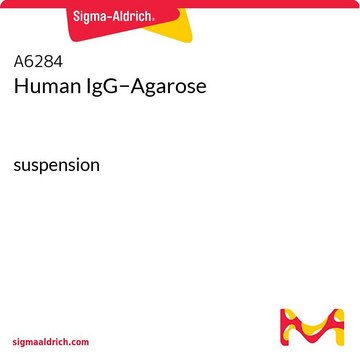A3543
Anti-Human IgG (whole molecule)−Agarose antibody produced in goat
IgG fraction of antiserum, PBS suspension
Iniciar sesiónpara Ver la Fijación de precios por contrato y de la organización
About This Item
Productos recomendados
origen biológico
goat
Nivel de calidad
conjugado
agarose conjugate
forma del anticuerpo
IgG fraction of antiserum
tipo de anticuerpo
secondary antibodies
clon
polyclonal
Formulario
PBS suspension
reactividad de especies
human
Extensión del etiquetado
~2.4 mg Ab per mL
técnicas
immunoelectrophoresis: suitable
capacidad
1 mg/mL binding capacity
temp. de almacenamiento
2-8°C
modificación del objetivo postraduccional
unmodified
Descripción general
IgG antibody subtype is the most abundant serum immunoglobulins of the immune system. It is secreted by B cells and is found in blood and extracellular fluids and provides protection from infections caused by bacteria, fungi and viruses. Maternal IgG is transferred to fetus through the placenta that is vital for immune defence of the neonate against infections.
Especificidad
Anti-human IgG recognizes human IgG (whole molecules). Goat anti-human is purified by ion exchange chromatography and then covalently bound to agarose.
Inmunógeno
Pooled normal human serum
Aplicación
Anti-human IgG (whole molecule) is suitable for immunoelectrophoresis. Antibody depletion from normal human serum was carried out by treating diluted serum with 50 microl of agarose-linked goat anti-human IgG (A3543) for 90 minutes at 4 °.
Antibody depletion from normal human serum was carried out by treating diluted serum with 50 μl of agarose-linked goat anti-human IgG (A3543) for 90 minutes at 4 degrees.
Acciones bioquímicas o fisiológicas
IgG stimulates the classical pathway of the complement system. It neutralizes virus particles and toxins. IgG plays a crucial role in antibody-dependent cell-mediated cytotoxicity (ADCC). IgG might be associated with allergy. It has the longest serum half life.. Maternal IgG is transferred to fetus through the placenta that is vital for immune defence of the neonate against infections.
Forma física
Suspension in 0.01 M phosphate buffered saline, pH 7.4, containing 15 mM sodium azide
Cláusula de descargo de responsabilidad
Unless otherwise stated in our catalog or other company documentation accompanying the product(s), our products are intended for research use only and are not to be used for any other purpose, which includes but is not limited to, unauthorized commercial uses, in vitro diagnostic uses, ex vivo or in vivo therapeutic uses or any type of consumption or application to humans or animals.
¿No encuentra el producto adecuado?
Pruebe nuestro Herramienta de selección de productos.
Código de clase de almacenamiento
10 - Combustible liquids
Clase de riesgo para el agua (WGK)
nwg
Punto de inflamabilidad (°F)
Not applicable
Punto de inflamabilidad (°C)
Not applicable
Elija entre una de las versiones más recientes:
¿Ya tiene este producto?
Encuentre la documentación para los productos que ha comprado recientemente en la Biblioteca de documentos.
T A Brighton et al.
The Biochemical journal, 340 ( Pt 1), 59-67 (1999-05-07)
Considerable interest is currently focused on the interactions of beta-2 glycoprotein I (beta2GPI) and anti-phospholipid antibodies with anionic phospholipids in an attempt to understand the association between these antibodies and clinical diseases such as thrombosis. The interactions of beta2GPI and
J Raper et al.
Infection and immunity, 67(4), 1910-1916 (1999-03-20)
Natural resistance of humans to the cattle pathogen Trypanosoma brucei brucei has been attributed to the presence in human serum of nonimmune factors that lyse the parasite. Normal human serum contains two trypanosome lytic factors (TLFs). TLF1 is a 500-kDa
A revised nomenclature for allergy: an EAACI position statement from the EAACI nomenclature task force
Johansson SGO, et al.
Allergy, 56(9), 813-824 (2001)
Placental transfer of IgG subclasses in a Japanese population.
Hashira S, et al.
Pediatrics International, 42(4) (2000)
Structure and function of immunoglobulins.
Schroeder Jr H W and Cavacini L
The Journal of Allergy and Clinical Immunology, 125(2), S41-S52 (2010)
Nuestro equipo de científicos tiene experiencia en todas las áreas de investigación: Ciencias de la vida, Ciencia de los materiales, Síntesis química, Cromatografía, Analítica y muchas otras.
Póngase en contacto con el Servicio técnico




